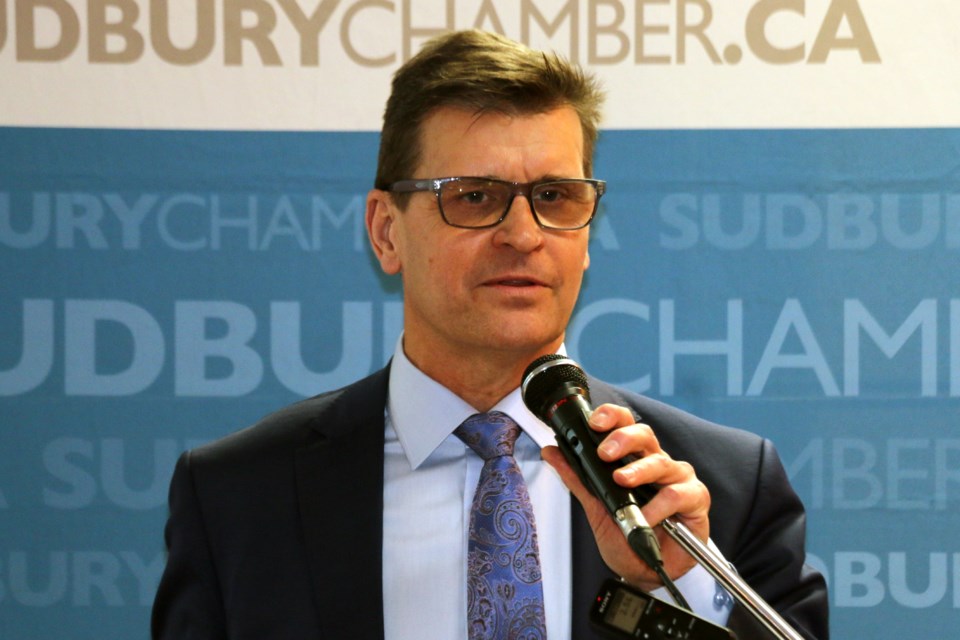In our first report of Health Sciences North CEO David McNeil speaking to the Greater Sudbury Chamber of Commerce Thursday, McNeil outlined how Sudbury's hospital has become a significant economic driver for the region, with a local operating budget of more than $700 million and having a regional impact of what McNeil said was close to a billion dollars in terms of employee incomes and money spent on goods and services.
Since being appointed as the new president and CEO of HSN last fall, his address to the Chamber this week was the first major speaking engagement for the man who heads up what is the largest single employer in the city.
McNeil also told the chamber audience that aside from the business impact of the hospital in Sudbury, there is a significant role played by the hospital in keeping more Northern Ontario people alive and healthier because of the innovations in medicine.
"And I think one of the things we need to celebrate is the quality of service and the innovation that happens here at Health Sciences North," said McNeil.
He remarked that improved technology means improved health care in many ways. He presented a brief video depicting the story of a man who suffered a stroke at home. He was rushed to HSN where they performed diagnostic imaging with a CAT scan. A large clot was found blocking part of his brain. Physicians at HSN were quickly able to perform appropriate surgery.
After the video McNeil remarked it would be hard to imagine what the outcome would have been without the technology and the specific surgical procedure that saved the man's life.
McNeil said Northerners are also exposed to some of the best cancer care anywhere in the world.
"And you know, one of the things that I think we can be very proud of is that the physicians and the staff at our cancer centre in the last three quarters of the last calendar year, have ranked number one in the province of Ontario in terms of their quality outcomes. They are now at number two, and we're trying to claw our way back to number one," he said.
"If you think about this in perspective, the cancer system in Ontario is one of the leading cancer systems in North America. And here we have in Sudbury, one of the leading cancer centres in all of Ontario. So that means you're getting access to world class cancer care," McNeil added.
He said HSN's radiology department, in partnership with Toronto's University Health Network, is able to have scans and X-rays, seen and read, far more quickly than before.
"We have access to world class radiology services. It has significantly improved our read time for example, for a CT scan, which would have typically taken seven hours, we're now down to having a CT scan read in one hour. You can imagine what that means in terms of patient care and having access to that information."
McNeil had additional praise for the work of surgeons at HSN. He said there was a time that some gastrointestinal surgeries would force a patient into lengthy recovery time in the intensive care unit, with a scar that looked like a "shark bite".
He said such procedures nowadays require what is called "keyhole surgery" that leaves a tiny scar with no ICU time required.
He said knee surgeries used to require two overnight stays in the hospital. Now, more than 85 per cent of knee surgery patients can go home the same day.
Another significant change said McNeil is the implementation of the Electronic Medical Records program (EMR) which is in the process of being integrated throughout the region.
"And on June 4, we will be renewing the implementation of our electronic medical record and that electronic medical record will connect all 23 hospitals in Northeastern Ontario. This will probably be one of the most significant changes that health sciences North will undergo in many, many years."
It means if you had a medical procedure done in the Iroquois Falls hospital and then transferred to Sudbury, all your medical background goes with you. You don't have to explain your medical history to several new people.
All that being said, McNeil said HSN still has its challenges. One of the key concerns he said is "hallway medicine".
"In any one day at Health Sciences north, we have over 100 people in unconventional bed spaces. So that means we can't put people into a normal hospital bedded room," said McNeil.
He said people are stuck in the emergency room, or in the Daffodil Lodge, or in spaces for outpatient care. It could even mean a patient is on a gurney in a hallway, he said.
McNeil said it is indeed a challenge, but it is being worked on. He said one thing that continually backs up the patient flow.
But better news is on the way, said McNeil.
He said the province has given HSN permission to expand through the Ministry of Health capital approval process. McNeil said by June of this year he is expecting the ministry to grant approval to move ahead to a detailed planning stage for expanding HSN.
“So this is really, really good news for our community,” said McNeil. He said it means the hospital will be able to consider new spaces for NEO Kids, acute care, and mental health along with inpatient mental health and addictions.
In a follow up question and answer period, McNeil said all and any expansion plans at this point will take place at the existing hospital site. McNeil said architects have already discussed options and it was clear there is sufficient room for expansion.
Len Gillis covers health care as well as the mining industry for Sudbury.com .
